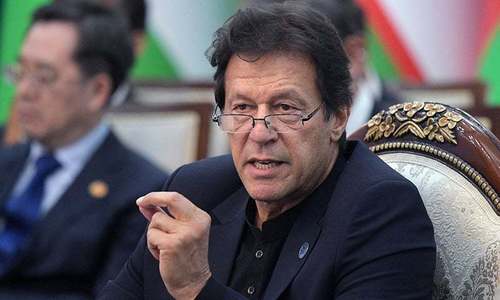Society must fight sex crimes, corruption itself: PM

ISLAMABAD: Terming rising corruption and sex crimes the two main evils confronting the Muslim world, Prime Minister Imran Khan on Sunday held a discussion with top scholars on how the youth could be protected from the invasion of social media on their faith and religious and ethical values.
“There are two sorts of crime in society, one is corruption and the other is sex crime. Sex crime has risen sharply in our society, i.e. rape and child abuse and only one per cent of this is reported,” he said while addressing ‘Riyasat-i-Madina: Islam, Society and Ethical Revival’, the second part of a dialogue organised by the National Rehmatul-lil-Aalameen Authority (NRAA).
“The other 99 per cent, I believe, society has to fight it. The same is the case with corruption… society has to make corruption unacceptable. Unfortunately, when you have leadership which is corrupt over time, they make corruption acceptable,” he said.
While seeking viewpoints of the international scholars, Mr Khan hinted that he would be holding similar dialogues with renowned scholars in the future as well. It was also decided that such thought-provoking sessions would be held once a month or two months.
Islamic scholars agree youth must be taught how to deal with challenges thrown up by modern life
The prime minister stressed the need to save the Muslim youth from being inundated with obscenity and pornographic material available on the internet.
The scholars in attendance suggested certain collective efforts by Muslim countries to counter the negative effects of modernity. They also stressed that by creating awareness about the life and sunnah of the Holy Prophet (Peace Be Upon Him) young Muslims could be equipped with qualities needed to navigate the challenges of the modern age.
Response by scholars
The scholars responded to various questions raised by the prime minister about the unbridled availability of pornographic material via social media, corruption, the rising number of sex offenses against women and children, and other challenges faced by the Muslim youth and contemporary society.
Dr Seyyed Hossein Nasr, University Professor of Islamic Studies at the George Washington University, said the impact of modern trends upon the Muslim youth could be felt today more than ever.
“Today, the world is a more precarious and dangerous place for the youth,” he said, adding that the Muslim youth should be guided through teachings that were authentic and pertained to the challenges they faced.
Dr Nasr denounced western elements that talked about Islam in negative tone, which was tantamount to attacking the religion.
He said Muslim countries were blessed with tremendous resources which could be utilised to revive and preserve their culture on the basis of faith. He added that the solution to present-day challenges could not be found within 24 hours as there was a dire need for gradually building awareness.
Shaykh Hamza Yusuf, an American scholar, likened the issue of corruption to a rotten apple which could decay a society. He said the Holy Quran had explained the issue of corruption and its impact upon individuals and society.
He was of the opinion that Islam had tasked men to take care of women and children in society. He stressed that young people should be taught to honour women.
Talking about concepts such as ‘mehram’, Mr Yusuf said women needed to understand why the Holy Prophet (PBUH) had always stressed these things.
“Not going to places that you shouldn’t be, that onus is first and foremost on the men and we can’t blame the victims. At the same time women need to understand there are wolves out there and those wolves are real.”
Dr Timothy Winter/Abdal Hakim Murad, dean of the Cambridge Muslim College, said information on mobile phones for the young generations was a real challenge for most of societies across the globe.
“Everybody knows the key trigger has been the availability, even to young children, of high resolution images of things that should be private and not made part of public entertainment. If the adolescent mind grows up recurrently addicted to these images, neuroscientists have pointed out that this results in permanent damage.”
He regretted that internet was not something that could be regulated by individual nation states.
Dr Recep Senturk, a Turkish academic, shared that the Muslim youth should be advised to adopt ethics derived from the sunnah of the Holy Prophet (PBUH), adding that they should be encouraged to develop their intellectual independence by following sunnah.
Dr Chandra Muzaffar, a Malaysian sociologist and thinker, suggested the holding of Muslim youth conferences where young people could participate, speak out their minds and articulate their position over contemporary challenges and solutions.
He said during the climate change conference in Switzerland, the youth participants had vented their anger against climate issues and shared their thoughts.
Dr Chandra acknowledged that young Muslims had respect for the dignity of human beings. He said, “People across the world should realise that all burning issues in today’s world are shared challenges to which Islam has beautifully provided solutions centuries ago.”
Interfaith dialogue
Dr Osman Bakar from the University of Malaysia said it was encouraging that students in universities and colleges were keen to learn about spiritual traditions.
He emphasised the need for interfaith and intercultural dialogue, which he said would bring stability.
Sheikh Abdullah bin Bayyah, chairman of the UAE’s Fatwa Council, said, “We are living in the age of globalisation and the advent of social media, internet and other modern concepts has a huge impact upon the youth.”
He suggested the idea of seeking ‘Sakinah’ by the youth, which means peacefulness of mind. According to him, it is the quality of soul that helps remove agitation from a person’s mind.
Sheikh Abdullah also underlined the need for the establishment of a university for Muslim youth that could focus on teaching morals and ethics.
He said the youth of Pakistan should learn more about great people such as Allama Iqbal.
Published in Dawn, January 3rd, 2022














































